Battle of Preussisch Eylau or the first victory over Napoleon
- well, who is not familiar with these lines from Lermontov's "Borodino"?
And do they not mean that at that time they did not fight in winter, but waited for warm weather and dry roads, since battles usually took place in the fields? But be that as it may, but in stories Russian weapons there was a battle in the midst of winter. Moreover, the battle with Napoleon himself, and such that it could be called
I wanted warmth and bread
And it so happened that in 1807, when Russia and Prussia, in alliance with each other, were at war with Napoleon, they were never able to conclude peace with him before the onset of winter. At the same time, the defeat of Prussia by this time had already been practically completed, and was so complete that only the corps of General Lestock survived from the entire Prussian army.
Meanwhile, in January 1807, Marshal Ney, being very dissatisfied with the poor living conditions in the winter quarters allocated to him near the city of Neudenburg, decided to act independently. And he sent his cavalry to Guttstadt and Heilsberg. But since both of these cities were only 50 km from Konigsberg, the capital of East Prussia, the Russians, in turn, came forward to meet him.
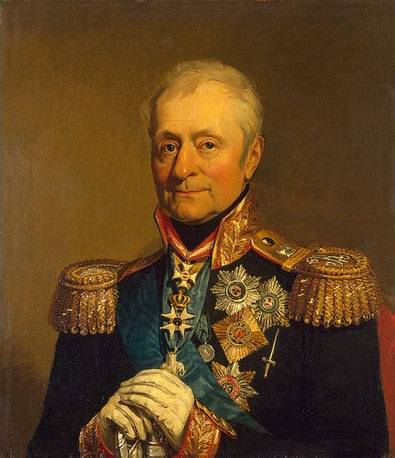
General of the cavalry L.L. Bennigsen in 1820 George Doe (1781–1829). Military gallery of the Winter Palace. State Hermitage. St. Petersburg
Napoleon also sent his troops against the Russian army and on December 26, 1806 attacked it near the town of Pultusk. And although the Russians retreated after this battle, this clash with them was the first where the troops under his personal command did not achieve an obvious victory.
Russian troops withdrew to the territory of East Prussia in an organized manner. They were commanded by General Leonty Leontyevich Bennigsen, a German in the service of the Russian army.
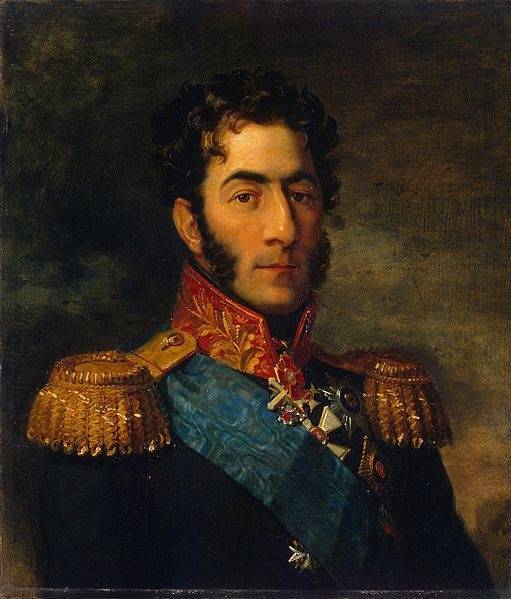
Lieutenant General P.I.Bagration. Military Gallery of the Winter Palace, State Hermitage. St. Petersburg
"The first column is marching, the second column is marching, the third column is marching ..."
Koenigsberg was the only major city that remained under the rule of the Prussian king Friedrich Wilhelm, so the allies had to keep it at any cost, including for political reasons.
Therefore, the Russian army immediately withdrew from its winter quarters and moved towards the French troops. At the same time, Bennigsen, covered on the right flank by the Prussian corps of General Lestock (up to 10 people), decided to attack the 000st Army Corps of Marshal Bernadotte, located near the Passarga River, and then cross the Vistula River and cut the communications of the Great Army in Poland.
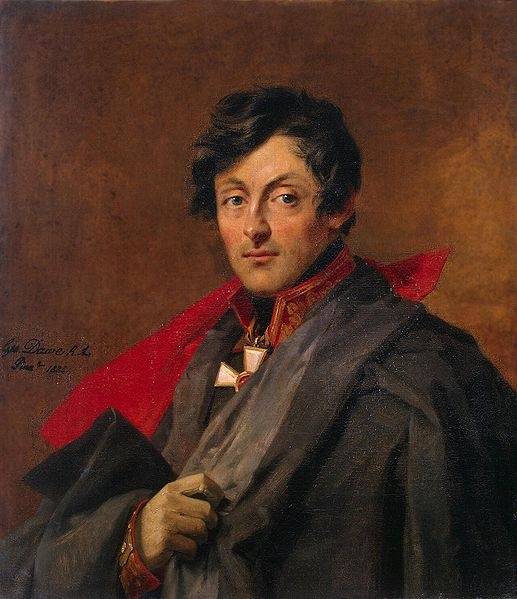
Lieutenant General A.I. Osterman-Tolstoy, who commanded the left flank of the Russian army at the Battle of Preussisch-Eylau. George Doe. Military Gallery of the Winter Palace, State Hermitage. St. Petersburg
Seeing the superiority of the enemy in forces, Bernadotte retreated.
Well, Napoleon, at first, expressed his strong dissatisfaction with Ney's actions. However, at this time frosts set in and the roads, in contrast to December, became passable. Therefore, Napoleon decided to surround and defeat the Russian army.
To do this, he divided the army into three columns and ordered them to march on the enemy. On the right, Marshal Davout was supposed to advance with 20 soldiers. In the center are marshals Murat with cavalry and Soult (a total of 000 thousand people), the guard (27) and the corps of Marshal Augereau (000). And on the left, Marshal Ney (6) - that is, he moved 000 soldiers against the Russian army. They were commanded, as we can see, by the most famous marshals of the Great Army.
However, the success of the maneuver depended entirely on keeping secrecy. But by the will of fate, all precautions were in vain. The courier who was carrying the secret package to Bernadotte fell into the hands of the Cossacks. And Bennigsen learned the plans of the French command.
The Russian army hastily began to withdraw. And, when Soult's corps went on the offensive on February 3, his blow fell into the void - Bennigsen was no longer in place.
Where the Russian army went, Napoleon did not know at first. Therefore, he ordered Davout to cut the roads leading to the east, and sent the main forces to Lansberg and Preussisch-Eylau. Bernadotte was to pursue General Lestock's corps.
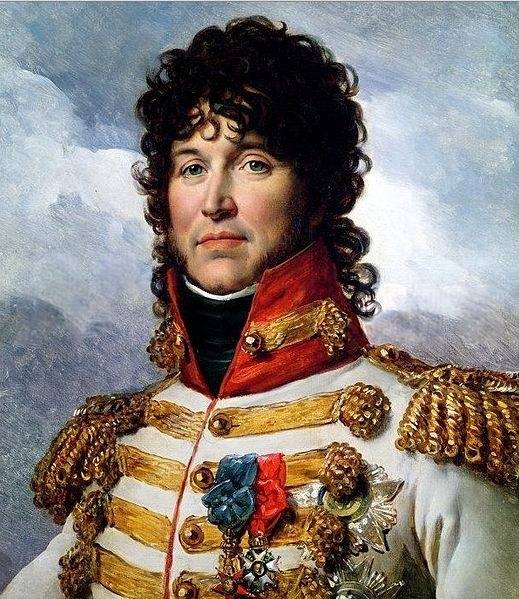
Murat is the favorite of Napoleon and the famous leader of the French cavalry. Francois Gerard (1770-1837)
The corps of Murat and Soult nevertheless caught up with the Russian rearguard under the command of Prince Bagration and General Barclay de Tolly. And they tried to attack him.
The battle at Gof on February 6 was especially stubborn. The next day, the fierce battle was repeated at the Ziegelhof. However, the Napoleonic marshals were unable to surround the Russian rearguard or defeat it.
But the position of the army was very difficult. In any case, one of his contemporaries described it like this:
Disorder and disorder are beyond human understanding. The poor soldier crawls like a ghost, and, leaning on his neighbor, sleeps on the move ...
This whole retreat seemed to me more a dream than reality. In our regiment, which crossed the border in full force and had not yet seen the French, the composition of the company decreased to 20-30 people ...
One can believe the opinion of all officers that Bennigsen had a desire to retreat even further, if the state of the army provided an opportunity for that. But since she is so weakened and exhausted, he decided ... to fight. "
Alien in a strange Fatherland
If you believe these words, it turns out that Bennigsen gave Napoleon a battle out of despair, and in general was not too brave.
However, it is worth getting to know his biography a little more in detail to understand that this is not at all the case.
By the way, it is interesting that both Bennigsen and Kutuzov were born in the same year, that is, in 1745 from the birth of Christ. Here are just Kutuzov in Russia, and Bennigsen in Hanover.
He was a real (and not Baltic) German and entered the Russian service at a fairly mature age, when he was already over 30. Moreover, he began serving in the army even earlier than Kutuzov, that is, from the age of 14, and, having entered to the Russian service in 1777, he already had a rich track record.
When he received an invitation from Russia, Bennigsen was already a lieutenant colonel in the Hanoverian army, and in Russia he began serving with the rank of prime-major, that is, he did not lose anything during the transition. And subsequently he participated in almost all the campaigns that the Russian army waged. That is, he earned all his awards and positions not on the floor, but in battle.
However, he was repeatedly wounded. And, fighting the Turks, he took part in the storming of Ochakov, which was very dangerous and bloody. And Bennigsen did not rise up the career ladder as fast as many of his colleagues.
"I don't like night battles!"
Meanwhile, Napoleon, having only a part of his Great Army with him, also did not immediately decide to engage in battle with the Russian troops.
On February 7, he declared to Augereau:
Tomorrow, when Ney and Davout line up, we will all go to the enemy together. "
However, the position of the French army was also far from brilliant.
In any case, an eyewitness wrote about it like this:
They make knee-deep transitions in the mud, without an ounce of bread, without a sip of water, without being able to dry their clothes, they fall from exhaustion and fatigue ...
The fire and smoke of the bivouacs made their faces yellow, emaciated, unrecognizable, they have red eyes, their uniforms are dirty and smoky. "
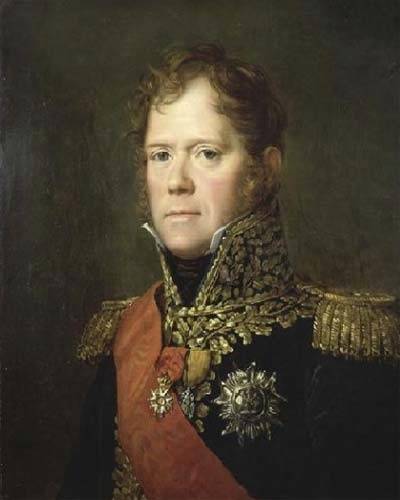
Marshal Ney. Francois Gerard (1770-1837)
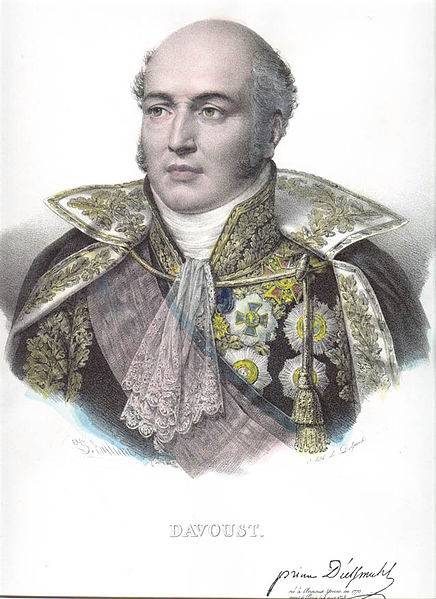
Marshal Davout, Duke of Auerstedt. Lithograph 1830
Napoleon hesitated and did not want to engage in battle until the middle of the day on February 8, waiting for the approach of Ney's corps, which was 30 kilometers from Preussisch-Eylau and Davout's corps, which was 9 kilometers away.
However, already at 5 o'clock in the morning, Napoleon was informed that at a cannon-shot distance from Eylau there was a Russian army built in two lines, the number of which at that time was 67 people with 000 guns.
Napoleon had 48-49 thousand soldiers with 300 guns.
During the day, both sides hoped to receive reinforcements. But if Bennigsen could count only on the approach of Lestock's Prussian corps, numbering a maximum of 9 people, the French expected the arrival of two corps at once: Davout (000) and Ney (15).
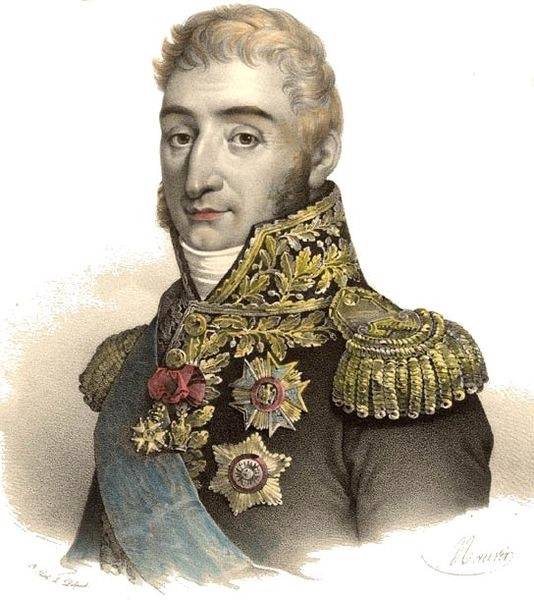
Marshal Augereau. Lithograph 1830
"We walked under the roar of cannonade!"
The battle began with a very strong artillery barrage.
The Russian batteries were more numerous than the French ones and brought down a hail of cannonballs on the enemy's battle formations. But, despite all efforts, they could not suppress the fire of enemy artillery.
The effect of Russian artillery fire could have been much greater if the French positions were not covered by city buildings. A significant part of the cores hit the walls of houses or did not reach the French at all.
On the contrary, the French gunners had the opportunity to freely defeat large masses of Russian troops standing almost without cover in an open field outside the city.
Denis Davydov, who participated in this battle, wrote:
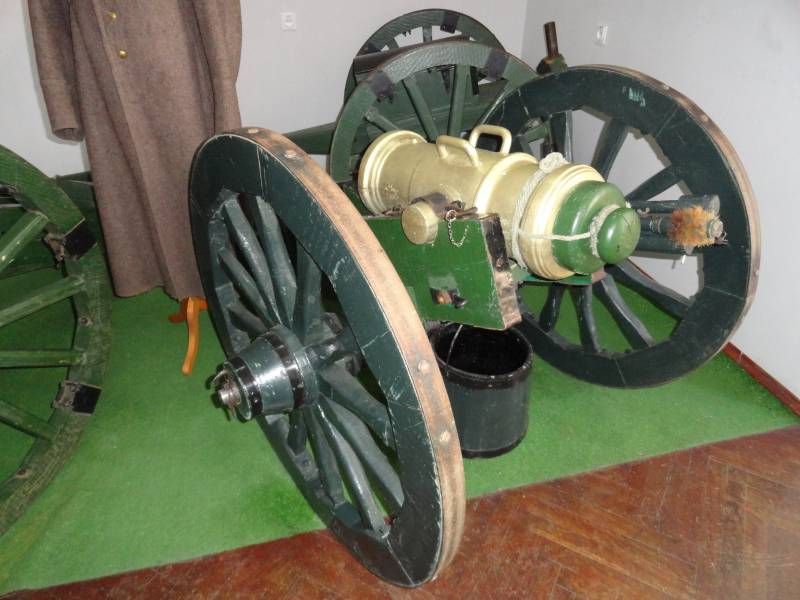
Model of a Russian howitzer from the Bagrationovsky Museum of Regional History in the city of Bagrationovsk
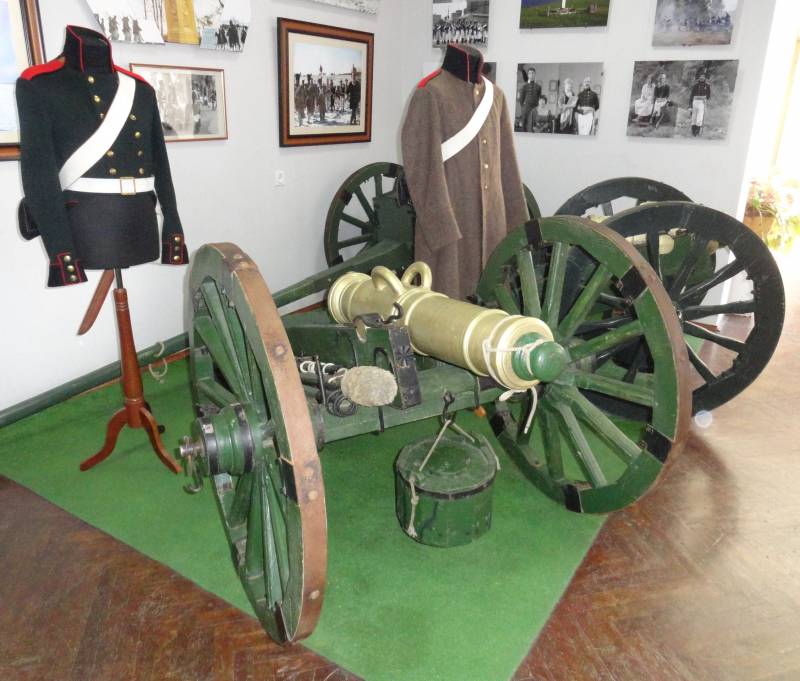
Model of the Russian field cannon from the Bagrationovsky Museum of Regional History in the city of Bagrationovsk. Next to the guns are samples of uniforms of soldiers of the Russian Imperial Army of 1805.
Left flank attack
Finally, around noon, columns of Marshal Davout's troops appeared on the right French flank. And the Great Army was equal in number to the Russian (64-000 against 65 soldiers).
Interestingly, everything went on in almost the same way as later under Borodino.
Davout's regiments deployed in battle formations and moved to attack the left flank of Bennigsen's army. At the cost of heavy losses, the French threw the Russians from the heights they occupied near the village of Klein-Zausgarten and, knocking the enemy out of the village itself, rushed towards the village of Auklappen and the forest of the same name.
For the Russian army, there was a real threat of the French going to the rear. And Bennigsen was forced, gradually weakening the center of his position, to begin the transfer of troops to the left flank.
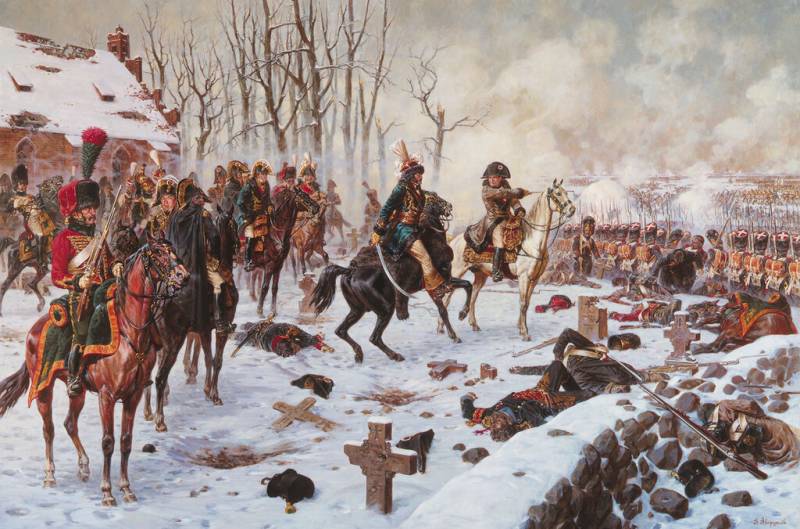
Battle of Preussisch-Eylau January 27 (February 8) 1807 Napoleon's command post. A.Yu. Averyanov. 2007 year
"What courage!"
Meanwhile, Napoleon noticed that a significant part of the Russian reserves was being concentrated against Davout, and decided to strike at the center of the Russian army, moving against him the corps of Augereau (15 men).
The first to attack were two divisions, but they had to go through a plain covered with rather deep snow to the south of the Preussisch-Eylau cemetery. Then a heavy blizzard hit both armies. And the battlefield was covered with thick clouds of snow. The blinded French troops, having lost the desired direction, deviated too much to the left.
When the blizzard stopped, it turned out that Augereau's corps was less than 300 paces opposite the largest Russian battery, consisted of 72 guns, that is, right in front of the muzzles of its guns.
At such a distance, it was simply impossible to miss, so every shot of the Russian cannons hit the target. One after another, the cannonballs slammed into the dense ranks of the French infantry and mowed whole glades in it. In a few minutes, Augereau's corps lost 5 soldiers killed and wounded.
Augereau himself was wounded, and Benningsen immediately took advantage of this. Russian drums beat the attack and four thousand grenadiers rushed to attack the French center. Later it will be called that:
and it was nearly crowned with success.
There was a moment when Russian soldiers broke through to the city cemetery itself, where Napoleon and all his retinue were.
Several dead from his entourage were already lying at his feet. However, Napoleon understood that now only his composure helps the soldiers to hold on.
Eyewitnesses testify that after seeing this attack, Napoleon said:
Just a little more and he could be captured or even killed.
But at this moment Murat's cavalry at full gallop crashed into the ranks of the Russian troops. Then a blizzard broke out again. Flintlock rifles could not fire.
Both infantrymen and horsemen, with difficulty distinguishing the enemy in the snow, fiercely stabbed each other with bayonets. And cut with broadswords and sabers. Both sides suffered heavy losses. However, an attack by Murat's cavalry saved the position of the French army. The opponents withdrew their forces to their starting positions, although the fierce artillery duel continued as before.
Counterstrike on the left flank
Meanwhile, the left flank moved back and made an almost right angle with the line of the Russian army. That is, the situation again developed exactly the same as later during the Battle of Borodino.
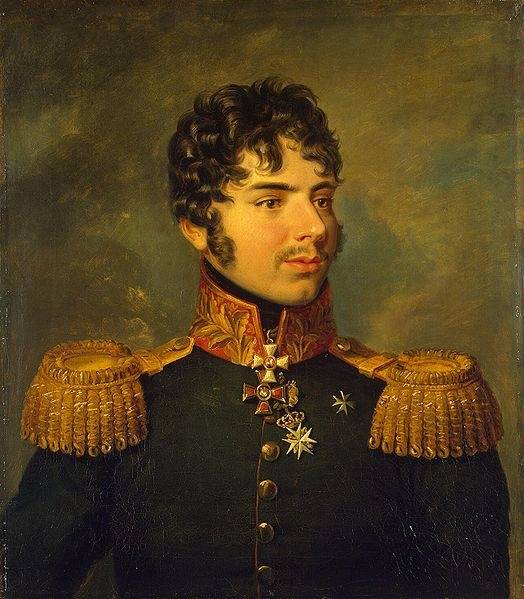
Major General A.I. Kutaisov. George Doe. Military Gallery of the Winter Palace, State Hermitage. St. Petersburg
At this critical moment, on the initiative of the chief of artillery of the right wing, Major General A.I. Kutaisov under Auklappen, three horse artillery companies with 36 guns were transferred under the command of Lieutenant Colonel A.P. Ermolova. And they opened accurate grape-shot fire at the French point-blank.
And then another 6 men from General Lestock's corps came to the aid of the troops of the left flank. A joint attack by the Russians and the Prussians followed, as a result of which the French retreated back to the same positions from which they began their attack.
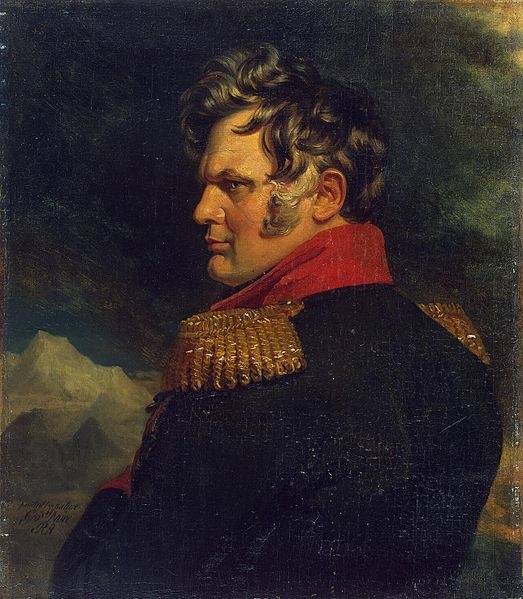
Lieutenant Colonel A.P. Ermolov. George Doe. Military Gallery of the Winter Palace, State Hermitage. St. Petersburg
End of the battle
On this, the Battle of Preussisch-Eylau actually ended.
The cannonade on both sides lasted until 21:XNUMX, but the exhausted and bloodied troops did not undertake any more attacks.
Meanwhile, already at dusk, Ney's corps approached the place of the battle on the Russian right flank, pursuing Lestok, but never caught up with him. His intelligence met with the Cossacks and reported that Russian troops were ahead.
Having no connection with Napoleon and not knowing how the battle ended, Ney went to bed, rightly judging that
The approach of fresh forces to Napoleon could not but alarm Benningsen, and he gave the order to retreat. At night, the Russian troops began to withdraw, but the losses of the French were so great that they did not interfere with it.
They say that Marshal Ney, looking in the morning at tens of thousands of dead and wounded, who were lying in the snow all over the field, interspersed with each other, exclaimed:
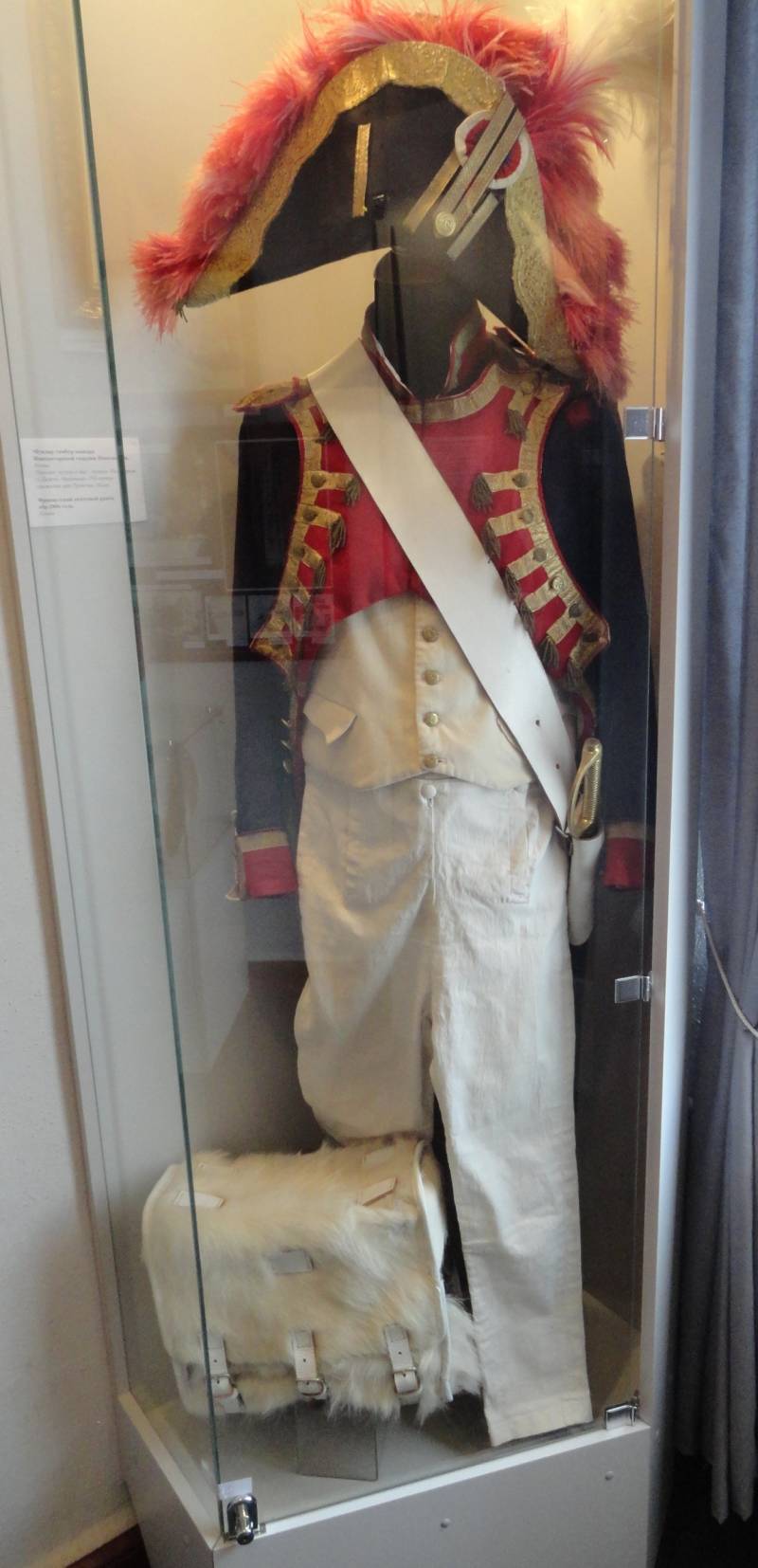
Tunic of the French tambour major. Bagrationovsky Museum of the History of the Region in Bagrationovsk
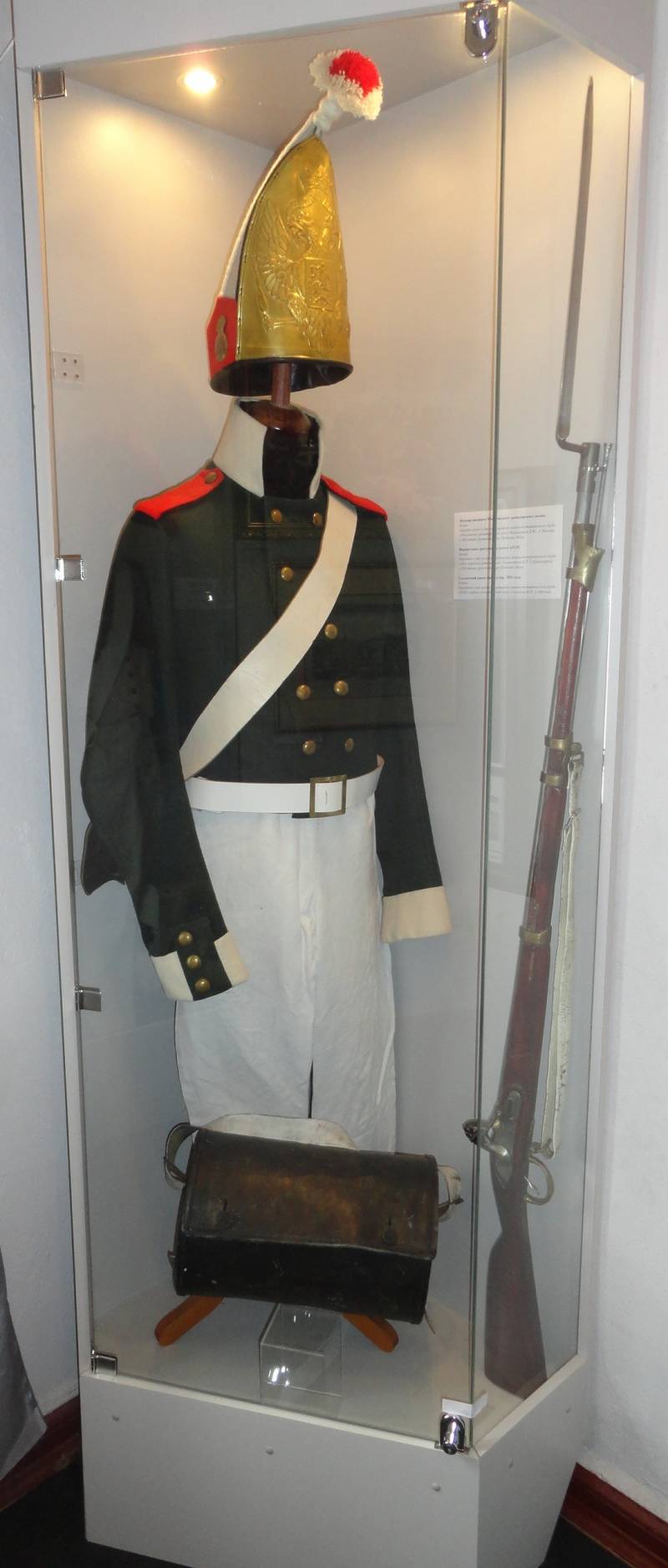
Grenadier of the Pavlovsky regiment in summer uniform. Bagrationovsky Museum of the History of the Region in Bagrationovsk
It is interesting that Napoleon stood in the city for 10 days, and then ... began to retreat.
The Cossacks immediately rushed after the French in pursuit and captured more than 2 wounded French soldiers.
Both the Russian general and the French emperor declared their victory, and Bennigsen received the Order of St. Andrew the First-Called for her and 12 thousand annual pension as the winner of Napoleon himself.
In the spring of the same year, he defeated Marshal Ney at Guttstadt. Then he repulsed Napoleon at Heilsberg, but he himself was defeated in the battle of Friedland.
By the way, Napoleon himself admitted that it was a victory of Russian arms in a conversation with Emperor Alexander I in Tilsit:
Denis Davydov, later evaluating the nature of the battle at Preussisch-Eylau, and comparing it with the Battle of Borodino, wrote that
In almost any battle such dumps of infantry and cavalry were not visible, although, however, these dumps did not interfere with the assistance of rifle and cannon thunderstorms for them, thundering on both sides and, rightly, sufficient to drown out the calls of ambition in the soul of the most ardent ambitious. " ...
The losses on both sides were really great.
Contemporaries numbered up to 30 thousand on each side, that is, as a result of the battle, almost half of the fighting was out of action. According to updated estimates, the French lost 22 killed and wounded, and the Russians 000.
As for the trophies of the Russian Imperial Army, they consisted of nine "eagles" - banners that had eagle-shaped tops in the French army,
The Prussian corps was able to capture two of these eagles.
A monument was erected on the battlefield at Preussisch Eylau shortly after the celebrations on 20 November 1856. And, fortunately, time has spared him.
Residents of the city of Bagrationovsk (now this city bears this name) love this place very much, and they call it as a monument to "Cannons" and "Monument to the Three Generals".
Indeed, from three sides one can see bas-relief portraits of Lestock, Dirik and Bennigsen.
The inscription on the fourth side reads:
On either side of it are two Krupp breech-loading cannons of the 1867 model.
But, naturally, they have nothing to do with this battle.
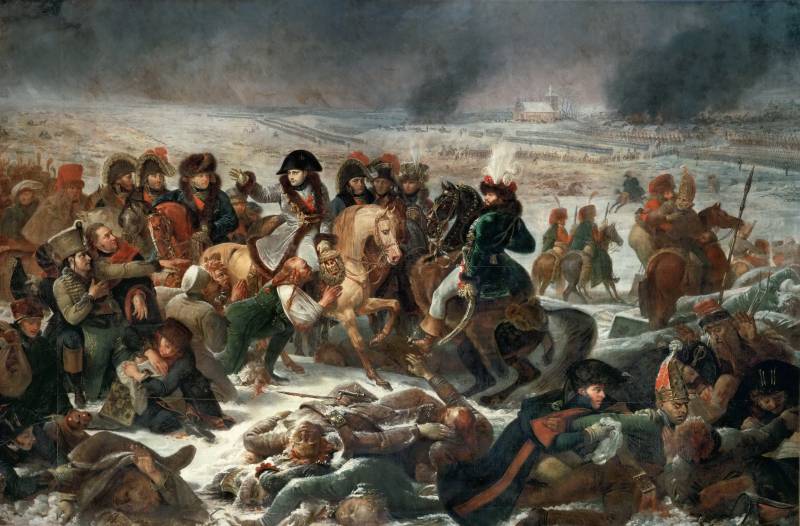
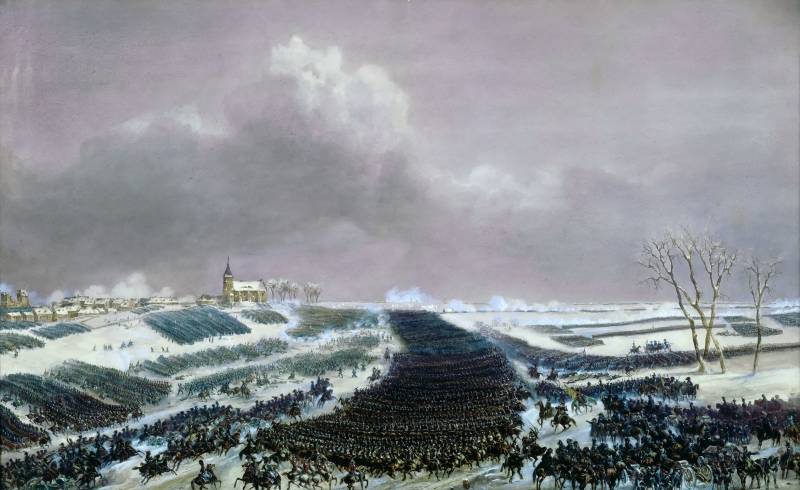
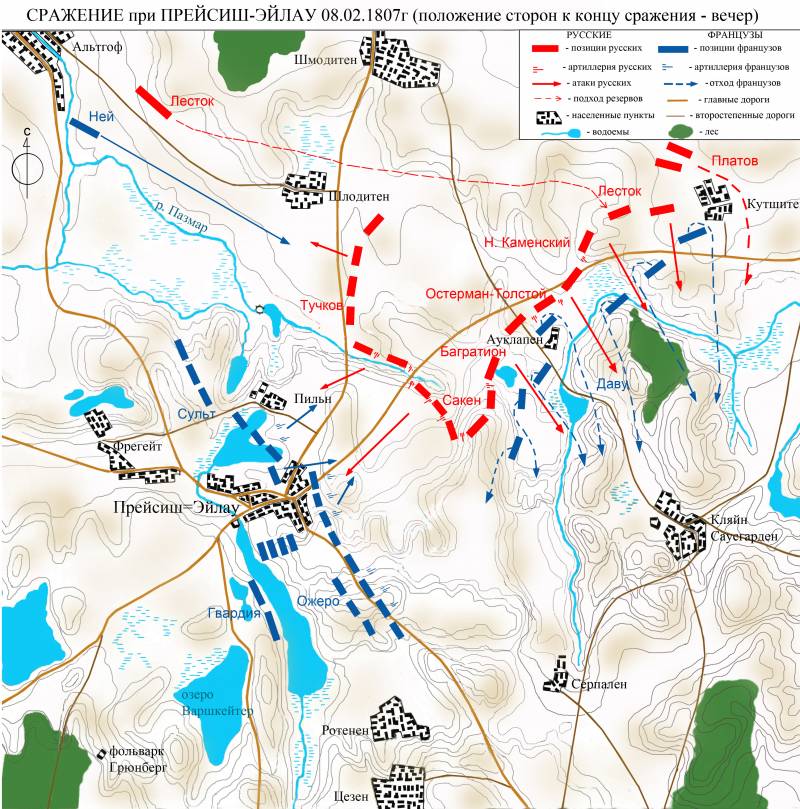
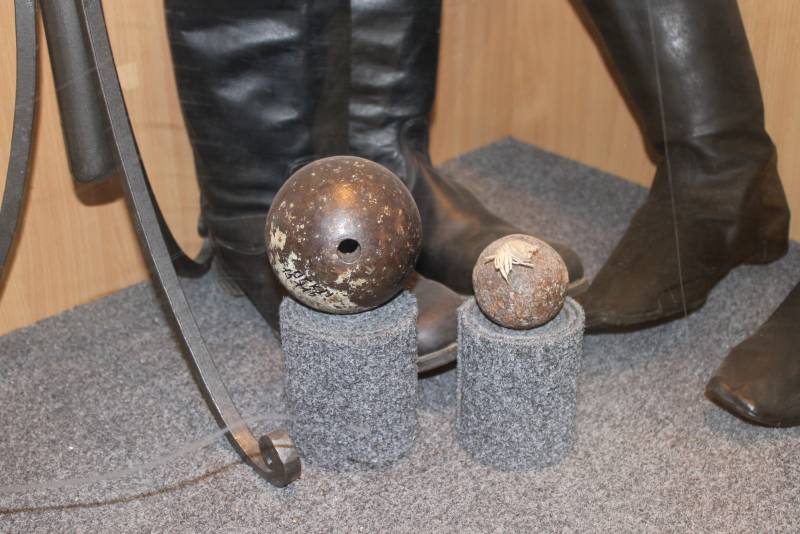
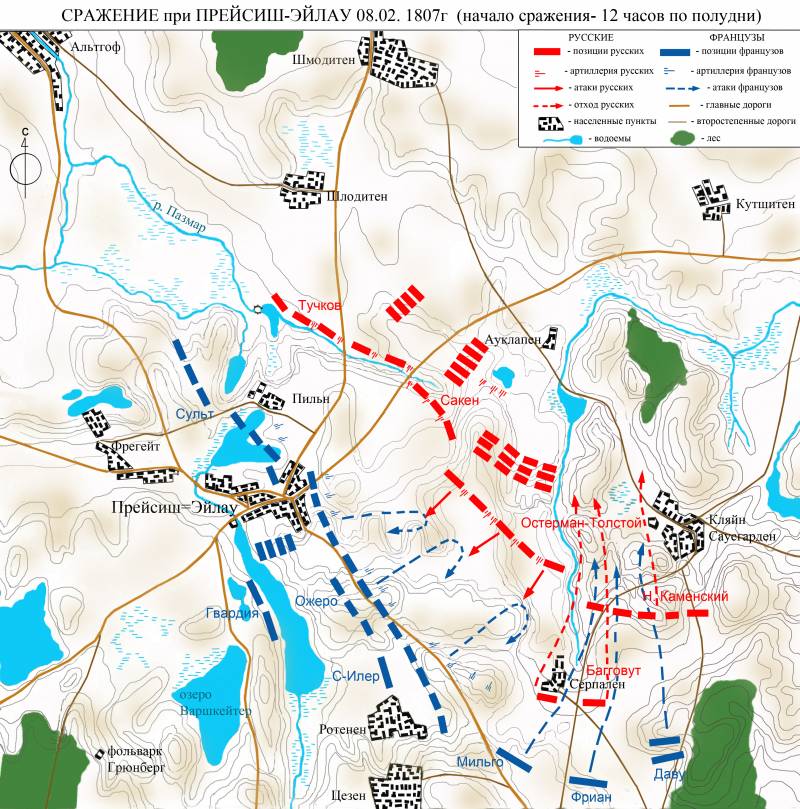
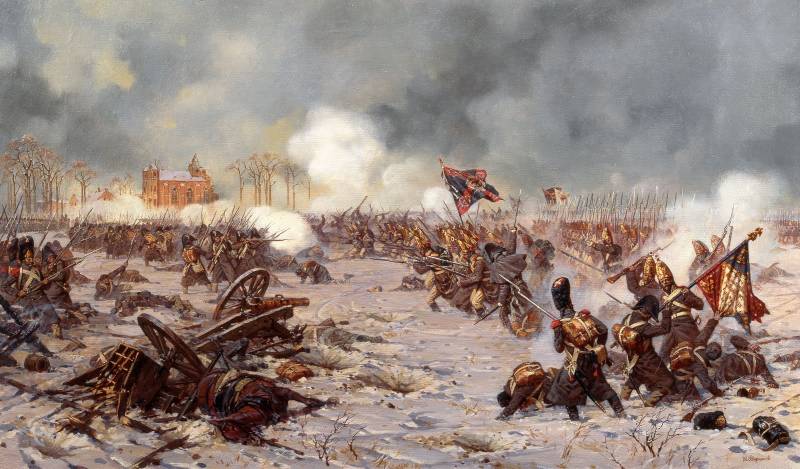
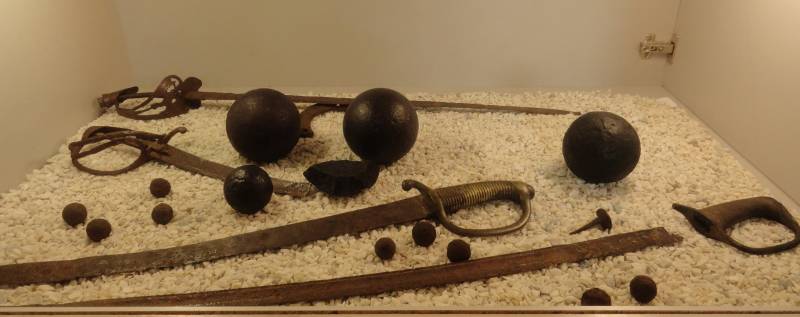
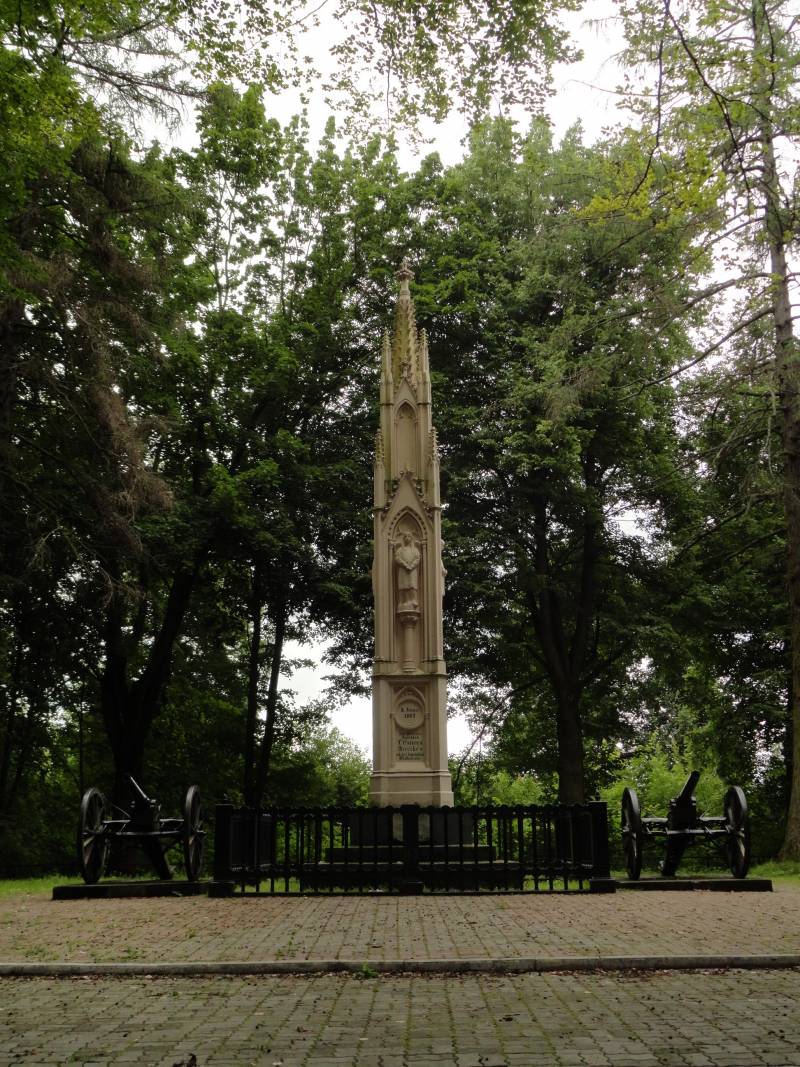
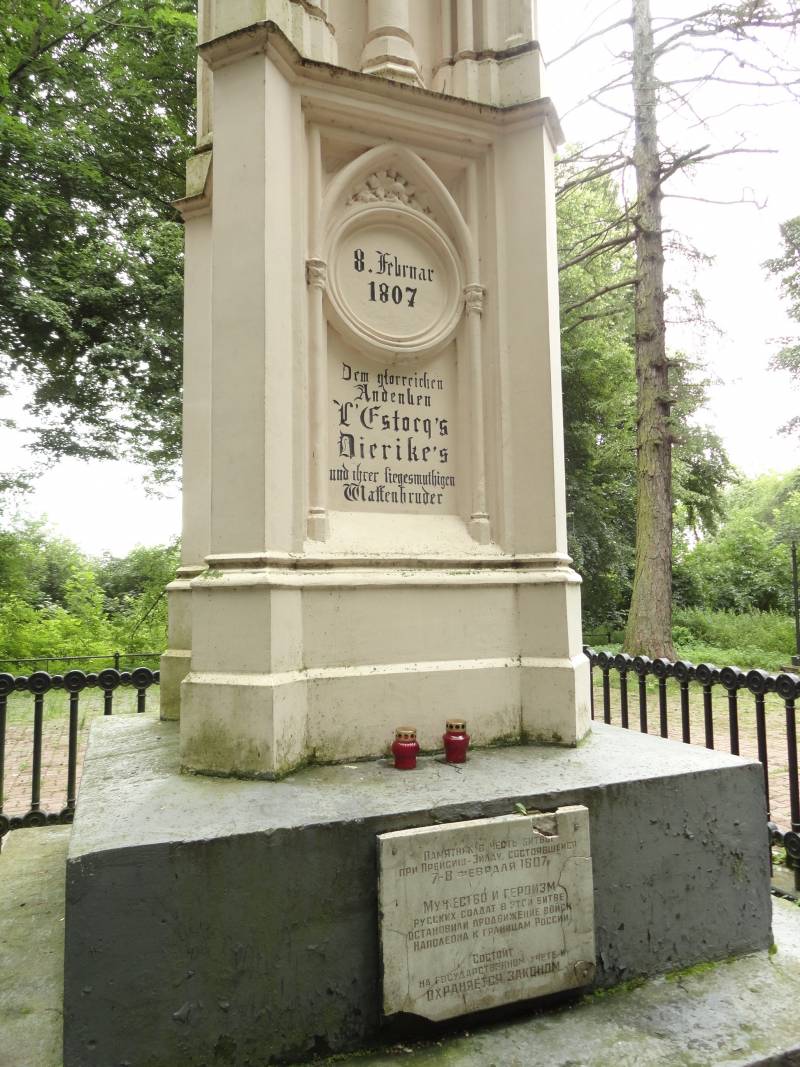
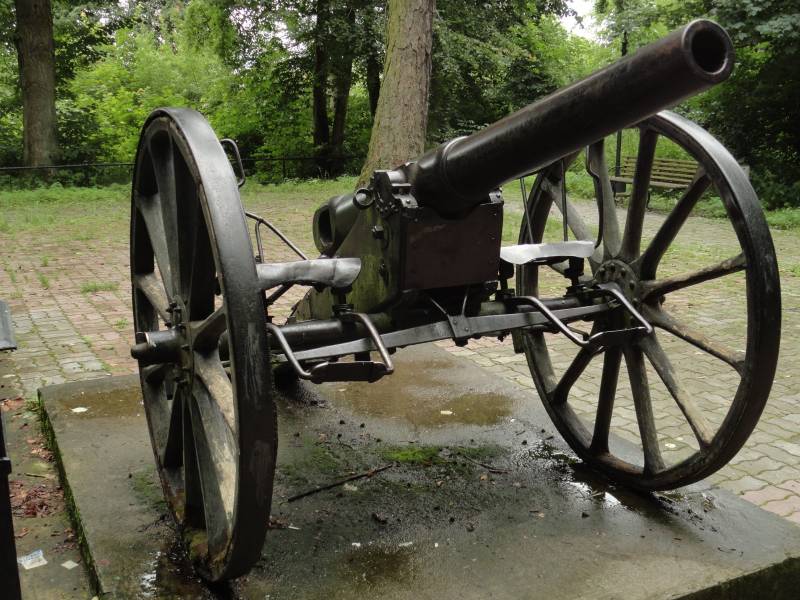
Information